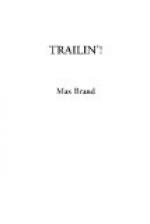“Well?”
The other smiled unpleasantly and made a gesture as if he were snapping a twig between his hands.
“I’ll break him in two.”
The eyes of Nash grew wide with astonishment; he was remembering that same phrase on the lips of the big, grey man, Drew.
He murmured: “That may give you a little trouble. Logan’s a peaceable chap, but he has his record before he got down as low as sheepherdin’.”
“I like trouble—now and then.”
A pause.
“Odd old shack over there.”
“Drew’s old house?”
“Yes. There’s a grave in front of it.”
“And there’s quite a yarn inside the grave.”
The cowpuncher was aware that the other stirred—not much, but as if he winced from a drop of cold water; he felt that he was close on the trail of the real reason why the Easterner wished to see Drew.
“A story about Drew’s wife?”
“You read the writing on the headstone, eh?”
“‘Joan, she chose this place for rest,’” quoted Bard.
“That was all before my time; it was before the time of any others in these parts, but a few of the grey-beards know a bit about the story and I’ve gathered a little of it from Drew, though he ain’t much of a talker.”
“I’d like to hear it.”
Sensitively aware of Bard, as a photographic plate is aware of light on exposures, the cowpuncher went on with the tale.
And Bard, his glance probing among the shadowy rafters of the room, seemed to be searching there for the secret on whose trail he rode. Through the interims the rain crashed and volleyed on the roof above them; the cold spray whipped down on them through the cracks; the wind shook and rattled the crazy house; and the drawling voice of Nash went on and on.
CHAPTER XX
JOAN
“Them were the days when this was a man’s country, which a man could climb on his hoss with a gun and a rope and touch heaven and hell in one day’s ridin’. Them good old days ain’t no more. I’ve heard the old man tell about ’em. Now they’ve got everybody stamped and branded with law an’ order, herded together like cattle, ticketed, done for. That’s the way the range is now. The marshals have us by the throat. In the old days a sheriff that outlived his term was probably crooked and runnin’ hand in hand with the long-riders.”
“Long-riders?” queried Bard.
“Fellers that got tired of workin’ and took to ridin’ for their livin’. Mostly they worked in little gangs of five and six. They was called long-riders, I guess, partly because they was in the saddle all the time, and partly because they done their jobs so far apart. They’d ride into Eldara and blow up the safe in the bank one day, for instance, and five days later they’d be two hundred and fifty miles away stoppin’ a train at Lewis Station.
“They never hung around no one part of the country and that made it hard as hell to run ’em down—that and because they had the best hosses that money could buy. They had friends, too, strung out all over—squatters and the like of that. They’d drop in on these little fellers and pass ’em a couple of twenties and make themselves solid for life. Afterward they used ’em for stoppin’ places.




